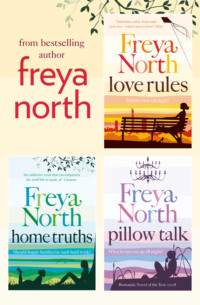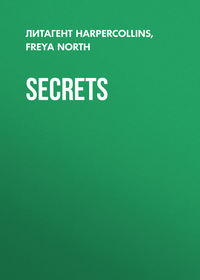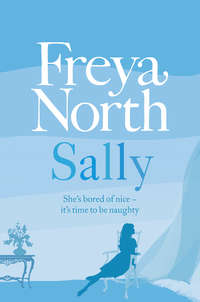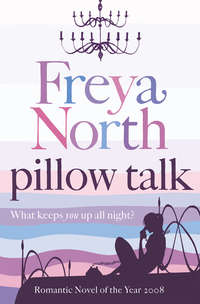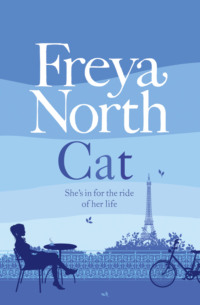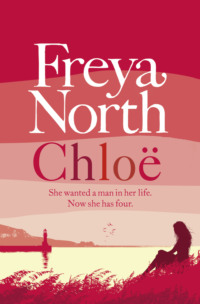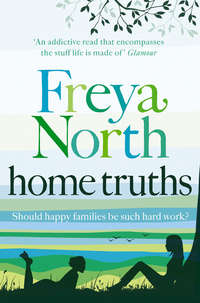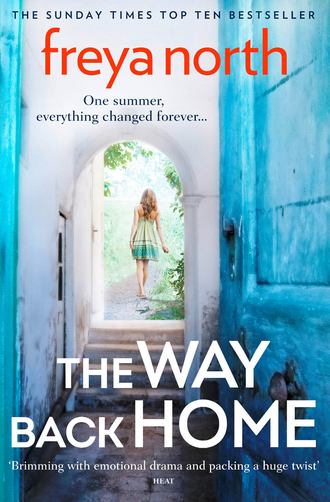
Полная версия
The Way Back Home

Praise for The Way Back Home
‘Brimming with emotional drama and packing a huge twist, this story will keep you guessing until the very end’ Heat
‘I was gripped from the start and raced through to the end in one long sitting’ Sara Lawrence, Daily Mail
‘A lovely read that keeps you anticipating a twist that is nicely unexpected … I couldn’t put it down‘ Sarah Broadhurst, Lovereading.co.uk
‘A very telling and enjoyable take on contemporary life’ Woman and Home
‘If you like emotional family dramas with a twist you’ll love this’ Daily Express
‘Freya North has given us another poignant tale – you won’t be able to put this one down’ OK
‘An intriguing tale that keeps you absorbed from cover to cover.’ Candis Magazine
‘It is a story of reflection and redemption – a tender tale that seems to have come from the very heart of this author’ New Books Magazine
‘Packed with love, lies and drama’ Woman Magazine
Acclaim for Freya North
‘Secrets will make you smile, sigh and cheer as this story proves love can be found in the most unexpected places’ Sunday Express
‘Darkly funny and sexy – literary escapism at its very finest’ Sunday Independent
‘The novel’s likeable central characters are so well painted that you feel not only that you know them, but that you know how right they are for each other … the beauty of the North Yorkshire countryside contrasts convincingly with the bustle of London’ Daily Telegraph
‘Freya North has matured to produce an emotivenovel that deals with the darker side of love – theseare real women, with real feelings’ She
‘A delicious creation … sparkling in every sense’ Daily Express
‘A distinctive storytelling style and credible, loveable characters … an addictive read that encompasses the stuff life is made of: love, sex, fidelity and, above all, friendship’ Glamour


COPYRIGHT
Published by HarperCollinsPublishers Ltd
1 London Bridge Street
London SE1 9GF
www.harpercollins.co.uk
First published in Great Britain by HarperCollinsPublishers 2014
Copyright © Freya North 2014
‘The Waste Land’ © Estate of T.S. Eliot printed with permission of Faber & Faber Ltd.
Don’t You Cry
Words & Music by Richard Hawley
© Copyright 2009 Universal Music Publishing MGB Limited
Universal Music Publishing MGB Limited
All Rights Reserved. International Copyright Secured.
Used by permission of Music Sales Limited.
Cover photography © Paul Knight/ Trevillion
Images (main image); Getty Images (girl, path)
Freya North asserts the moral right to be identified as the author of this work.
A catalogue copy of this book is available from the British Library.
This novel is entirely a work of fiction. The names, characters and incidents portrayed in it are the work of the author’s imagination. Any resemblance to actual persons, living or dead, events or localities is entirely coincidental.
All rights reserved under International and Pan-American Copyright Conventions. By payment of the required fees, you have been granted the non-exclusive, non-transferable right to access and read the text of this e-book on screen. No part of this text may be reproduced, transmitted, down-loaded, decompiled, reverse engineered, or stored in or introduced into any information storage and retrieval system, in any form or by any means, whether electronic or mechanical, now known or hereinafter invented, without the express written permission of HarperCollins.
Source ISBN: 9780007517800
Ebook Edition © May/June 2014 ISBN: 9780007507696
Version: 2016-11-11
DEDICATION
In loving memory of Hannah Berry 1983-2013
Beautiful, funny and brave. We miss you.
www.beatingbowelcancer.org
CONTENTS
Cover
Praise for The Way Back Home
Title Page
Copyright
Dedication
Chapter One
Chapter Two
Chapter Three
Chapter Four
Chapter Five
Chapter Six
Chapter Seven
Chapter Eight
Chapter Nine
Chapter Ten
Chapter Eleven
Chapter Twelve
Chapter Thirteen
Chapter Fourteen
Chapter Fifteen
Chapter Sixteen
Chapter Seventeen
Chapter Eighteen
Chapter Nineteen
Chapter Twenty
Chapter Twenty-One
Chapter Twenty-Two
Chapter Twenty-Three
Chapter Twenty-Four
Chapter Twenty-Five
Chapter Twenty-Six
Chapter Twenty-Seven
Chapter Twenty-Eight
Chapter Twenty-Nine
Chapter Thirty
Chapter Thirty-One
Chapter Thirty-Two
Chapter Thirty-Three
Chapter Thirty-Four
Chapter Thirty-Five
Chapter Thirty-Six
Chapter Thirty-Seven
Chapter Thirty-Eight
Epilogue
Reading Group Questions
Q&A With Freya North
The Story of Windward
Keep Reading
Acknowledgements
About the Author
By the same Author
About the Publisher
When I was …
When I was born there were already other children at Windward. None was beyond toddling age and, as such, we were grouped together pretty much like the clumps of perennials in the garden, or the globs of paint on a palette in one of the studios, or the music which drifted from the top rooms – discordant notes that, as a whole, wove together into a quirky harmony of sorts. We were who we were, the children of Windward – a little ragtaggle tribe further defining the ethos and eccentricity of the place.
I wasn’t born in a hospital. I was born at Windward but I wasn’t born in my home. I was born in Lilac and George’s apartment with Jette assisting my mother, ably helped by all the other females there at the time, whether permanent or itinerant, mothers or girls, lesbians, lapsed nuns and even an aged virgin. I know all about a woman called Damisi who was visiting at the time though, it seems, no one really knew where her connection lay. She was a doula, apparently, and I know the story off by heart – how she had all the women breathing and bellowing to support and inspire my mother to relax. It worked – I know I was as easy a birth as it’s possible to have, slipping out into the Windward world to a backing track that was practically a bovine opera. Some of the other children heard – how could they not – and often, they mooed at me. I didn’t mind – it seemed my own special herald. However, when I first heard a similar sound emitted by a cow it scared me senseless.
When I was five, Louis, who was always very old but never seemed to age, hosted my birthday party in his apartment. We didn’t know he knew magic. He took pennies from behind all our ears – it was probably the first time any of us had coins of our own. He gave me a piggy bank to keep mine in – to start saving the pennies, he explained. I thought I had to save the coins from some fate that would otherwise befall them.
When I was ten, my birthday party was a disaster. I’d been at the local school for three years, been to the parties of my classmates – pink and proper, simultaneously joyous and lively and yet fastidiously organized. That’s all I wanted – a party like that. A neat cake with the right number of candles. My parents got it wrong. There were only nine candles. Someone – probably my mother – had put a tenth one in, but had decided that it was incorrect. Ten? That’s wrong. That small dent in the beige icing of my lopsided, inedible cake was to me a sinkhole of indifference. It struck me then that perhaps not everyone loved everyone.
When I was fifteen –
When I was fifteen something terrible happened.
CHAPTER ONE
Oriana
To Oriana, it seemed so small. So ridiculously and unnervingly small that she felt compelled to rub her eyes. It had to be an illusion – the truer, more sensible, more realistic proportions would surely be reinstated after a good blink. But there it was still, nestled in a fold of land which looked soft enough to be made of fabric. Like biscuit crumbs in a scrunched napkin, there was the small town outside which she’d grown up. She pulled the hire car in to the verge. She didn’t want to get out, she wanted to avoid familiar smells that might make it seem real. She didn’t want to hear anything that might say well! welcome back, duck. She wanted to believe that she had no history with this mini place and no need of it. It looked silly, being so small. Not worth a detour. Certainly not worth a visit. Not worthy, even, of a drive right through. This wasn’t Lilliput. This wasn’t romantic. This was Nowhere. Nowhere, also known as Blenthrop, Derbyshire. The worst thing about this bastard place striking Oriana as being so small was that it made the rest of the world feel so vast. And suddenly she felt isolated, acutely alone and terrifyingly far away from the place she’d called home for so many years, the place she’d left only the previous day. God Bless America, she said under her breath though she knew she’d never go back.
Driving to her mother’s house was easier because she’d never lived there. There was little to recognize, nothing to flinch at; she was unknown and that was preferable to intrusive welcomes and waves, however warm and well meaning Blenthrop folk might be. The further she drove from her childhood home, the longer the space she could finally create between her ears and her shoulders. As she relaxed a little, the car seat felt more comfortable and her headache lifted. Really, jet lag had nothing to do with the tension and now that the anxiety had dissipated, Oriana let the genuine tiredness billow over her the way her mother used to waft her duvet when she was a little girl, giggling in bed waiting for it to land. They call it a comforter in the United States, she thought. My mum’s gone all sheets and blankets because she says it makes the bed look ‘properly made’. My mom – the all-American girl who’s now as small-town English as they come.
The tiredness, the tiredness. Should she pull over? Half an hour left to Hathersage. Open the window. Turn the radio up another notch. Drink Coke. Pinch yourself awake. Pinch yourself that you really are here again, eighteen years on. Kick yourself, wondering if it’s a stupid idea, really.
* * *
Oriana’s mother didn’t know what to do. Her daughter was sleeping and though she’d told her mother not to let her, under any circumstances, what was Rachel to do? Her daughter, wan and sunken-eyed, too thin. Rachel looked in at the front room. Oriana was curled embryonically into a corner of the sofa, her hands tucked tightly between her thighs, the tips of her socks hanging limply a little way off her toes; the heel of her right sock was twisted to her ankle, as if her shoe had wanted to cling onto her feet. Her hair looked lank and flat and her lips were chapped. She wasn’t wearing earrings. She’d spilled something on her top. This wasn’t jet lag, Rachel sensed. This was exhaustion.
Rachel had done that trip back to America often enough since she herself emigrated from there aged nineteen. She knew well that, though jet lag made you feel discombobulated, it didn’t make you look like that – how Oriana had looked on arriving an hour ago. When Rachel had opened the door to her daughter, she read in half a glance all the unrevealed secrets and sadness that had slipped unnoticed between the lines of her sporadic emails. On her doorstep, Rachel saw how the crux of it all was suddenly writ large over Oriana’s face, her general scrawniness. The details, however, remained concealed. She was shocked. How could she have known nothing? She was ashamed that, once again, a mother’s instinct had failed her.
‘I’ll give her another ten minutes,’ Rachel said, unsure.
‘That’ll make it forty winks,’ Bernard said. ‘I’ll be popping out now. Just round the block.’ And he kissed his wife who, just then, really did love his habit of explaining life with sayings and clichés. Bernard Safely. Had ever a person had a more appropriate surname?
‘Two shakes,’ Bernard told her though they both knew that his walk around the block would take far longer than two shakes of a lamb’s tail. She watched him through the bubbled-glass panel of the front door as he walked away. The distortion made him appear to have no bones, amorphous as jelly. Her ex-husband, Oriana’s father, referred to Bernard as spineless. Through the warped glass, he did indeed look so. Rachel felt disloyal. She rarely thought about Robin these days. She supposed she’d have to, now Oriana was back, even if she didn’t want to. She’d see him in her daughter’s crooked smile, her high cheekbones, the way her gaze darted away while she talked but focused fixedly on whoever spoke to her. Father and daughter both had the ability, without realizing it, to make one feel simultaneously inconsequential and significant.
‘Oriana Taylor,’ Rachel said quietly and then, in a whisper, ‘Oriana Safely.’
It didn’t flow. It didn’t work. It would never have worked. She’d always be Oriana Taylor, daughter of Robin. The Robin Taylor. Would they mention him? She and her daughter had managed for eighteen years to skirt issues as if they were dog mess on the pavement.
* * *
Malachy
An ex-girlfriend had described it as Saturn Returns. Malachy hadn’t a clue what she meant. That dream you have, she’d said, you might not have it often but it’ll always recur – like Saturn Returns, with similar cataclysmic fallout. It makes you introverted and horrid to be around.
He’d ended the relationship soon after. She was a bit too cosmic for Malachy and she talked too much anyway. If he had the dream, the last thing he needed was a load of astrobabble bullshit. A warm body cuddling next to him, soothing him, taking his mind off it – that’s what he required. Saturn Returns. She never knew that a prog-rock band of that very name had formed in his childhood home, exploded onto the music scene for a couple of years in the late 1970s and then finally imploded back at the house in 1981. He never told her, even though the band had jammed in the very place where Malachy currently lived.
Last night, the dream had once again hijacked his sleep, apropos of nothing. In the woods, with his brother Jed, their teenage bodies of twenty years ago encasing their current souls. They were out at summer dusk, shooting rabbits. A large buck running away, stopping, turning and facing him. Delicate eyes and soft silver pelt conflicting with the anomalous fuck-you gesture of lope-long ears rigid like two-fingered abuse. Malachy pulled the trigger and smelt the saltpetre and heard the harsh crack and felt the kick and experienced the extreme pain as half his world went dark.
He’d often wondered whether the rabbit was some kind of metaphor. He’d tried to analyse why in the dream he didn’t shout for help; why his brother was there only at the start. And he never knew whether he killed the rabbit, the little fucker. The pain cut the dream short, always. And he always woke up thinking, but it didn’t happen like that, it didn’t happen like that. And he’d be cranky and introverted for a good while after because he knew that he’d much rather it had happened like in the dream.
Stupid dream. Malachy left his bed and showered. Dressed, he snatched breakfast, yesterday’s post in one hand, toast in the other. What he really wanted to do today was write his novel, not go to work. Business was slack this time of year – early March, thick frost, too cold for tourists, too close to Easter for more hardy holidaymakers; too close to Christmas and Valentine’s and Mother’s Day for locals to fritter any more of their money. The irony was Malachy could very well not open the gallery because, after all, he owned it – but the fact that he owned it compelled him to keep it open, never take time off, never get sick. Tuesday to Friday, 10 till 6. Saturday 10 till 5. Summer Sundays 11 till 2. Closed Mondays. If the gallery was as quiet as he anticipated, he’d work on his novel from there today. He left the apartment, glancing guiltily at the house. He ought to do the rounds, really. He hadn’t done so for a couple of days.
Paula de la Mare waved at him, before she hopped into her car, belting down the drive. Malachy followed, absent-mindedly creating acronyms from the letters on her car’s registration plate. At the bottom of the drive, she turned right, taking her girls to school. Malachy followed her a little way before joining the main road into Blenthrop.
Some idiot had dumped litter in the doorway of the White Peak Art Space; yesterday’s chips lay like flaccid fingers in the scrunch of sodden paper. He rummaged in his satchel for something suitable like a plastic bag. Phone. An apple. Slim leather diary (he refused to use his phone for anything other than calls). A tin of pencils, a spiral-bound notebook and a flashdrive. He had no plastic bag. The toe of his shoe would have to do. He shoved the takeaway detritus into the gutter and opened up the gallery.
It was always the weirdest feeling. It never diminished and it engulfed Malachy the moment he entered. The immediate stillness and quiet of the space contradicted by the undeniable sensation that, up until that very moment, they’d been alive; the paintings, the sculptures. If he’d turned up a minute earlier, or sneaked in through the back, he was certain he’d have caught them at it. Now, as every day, they were just figures frozen into their canvases, others quite literally turned to stone, bronze or, in the case of Dan Markson’s work, multicoloured polymer. It was like the characters in his novel – Malachy sensed they existed without him but whenever he returned to the manuscript, he found them exactly where he’d left them.
In the gallery, he straightened a couple of frames and adjusted the angle of a spotlight that was glaring off the glass of a watercolour. There were few emails to respond to and within the hour Malachy felt justified in inserting the flashdrive and clicking on the folder called ‘novel’, selecting from within it the file called ‘novel10.doc’.
‘Tenth draft in only fifteen years.’
He said it out loud, with contrived loftiness, laughed and took the piss out of himself, receiving the abuse well. All residual effects of the dream had gone, the details were forgotten. Until the next time.
* * *
Jed
None of his girlfriends knew this, but whenever Jed had sex in the morning, he always had Ian Dury playing in his head. He’d grown used to the soundtrack. It wasn’t a distraction and it didn’t irritate him; it was a brilliant song after all – as sexy in its funk as it was funny in its lyrics. It had started with Celine. She had been French, intense and passionate, and when she’d purred in his ear in the middle of his sleep, wake up and make love with me, that’s what kicked it all off.
Jed knew his current relationship was on the way out; from fizz to fizzle in eight months. It had been as awkward as it had been depressing last night, to be the only non-conversing table in a packed and buzzing restaurant. They checked their phones, ate, gazed around the room, checked their phones again, eavesdropped on other people’s conversations and barely looked at each other. Fiona went to bed when they arrived back at his flat. I’m tired, she’d said, as if it was Jed’s fault. He’d sat up late, finishing off the red wine he’d opened the night before, even though he’d forgotten to put a stopper in it and it really didn’t taste very good. Jed had thought, I’m too young to be one of those couples that go out for dinner and don’t speak. And then he thought, I’m too old to be frittering away time on a relationship like this. I have a headache, he thought, collapsing into bed and drifting to sleep before he could remember to kiss her goodnight let alone check she was even there.
But he woke, horny. It was natural, chemical. Ian Dury was goading him to have a proper wriggle in the naughty, naked nude. He sidled up to Fiona, his cock finding the soft dale between her buttock cheeks to nestle in. Unlike Ian Dury, however, it wasn’t lovemaking he wanted. Just a fuck. She moved a little, her breathing quickening as he ran his hand along her thigh, up her body, a squeeze of her breast before venturing downwards and between her legs. She was warm and moist and she let him manoeuvre her so that he could work his way into her from behind. No kissing. She had a thing – paranoia – about morning breath, which initially he’d found charming, then irritating but today just useful, as he didn’t want kissing and eye contact. He just wanted to come because soon enough she’d be gone.
She dumped Jed in a stutteringly over-verbose phone call that lunch-time. It’s not you, it’s me. I just need some space. Let’s just be friends. It’s fine, he kept saying, I’m fine with it. I agree. If something of such little substance was finally over, it really didn’t warrant this level of analysis or justifying. Don’t worry, he told her, don’t worry. I feel the same.
‘You feel the same?’ She sounded affronted, as if her self-esteem was dependent on him being crushed.
Jed sensed this. ‘I mean,’ he qualified, ‘if you’re sure. Take all the time you need.’
‘I’m sure,’ she said.
‘OK,’ he said, ‘OK.’ And for her benefit, he dropped his voice a tone or two. ‘Take care,’ he said.
‘You too,’ she said. ‘Friends?’
‘Friends.’
He had too many of these ‘friends’ with whom he had mercifully minimal contact. None had truly made the transition from girlfriend to friend. None had even re-formed into useful booty calls. Ultimately, none meant that much to him because none was the one who got away. He hadn’t seen her for such a long time, not since she moved to America a decade and a half ago.
CHAPTER TWO
Nine o’clock. Oriana felt pleased with herself. Apart from a vaguely recalled period of wakefulness in the small hours and despite the nap that her mother had tricked her into taking the previous afternoon, she’d slept through the clash of time zones and she’d slept well enough for it to feel truly like morning. There was no need to count the hours backwards and figure out what the real time was. She accepted that nine in the morning, GMT, was now the true time in her life. She looked at the dressing gown her mother had laid out for her. It was white towelling and had the crest of a hotel embroidered in navy on the breast pocket. My mum has become one of those people who actually buy the hotel robe. She didn’t know whether she should laugh or cringe at this. She did know she’d rather get dressed than put the thing on. This wasn’t her home and it wasn’t a hotel and she wasn’t comfortable mooching about in borrowed towelling robes. She opened the bedroom door and listened hard. The house appeared to be empty but still Oriana padded quietly, self-consciously, along the corridor to the bathroom. She thought, this is the type of carpet I fantasized about as a child. The colour of butterscotch and as softly dense and bouncy as a Walt Disney lamb. And the bathroom itself; warm, bright and spotless, with hotel toiletries placed neatly on the sink and the bath – additional prerequisites of her childhood dreams. And yet she could not remember her mother ever yearning for such things.


